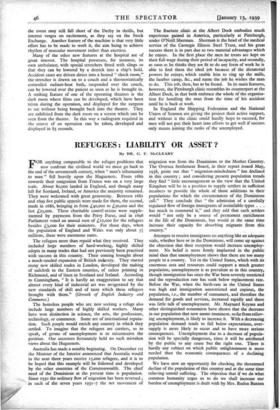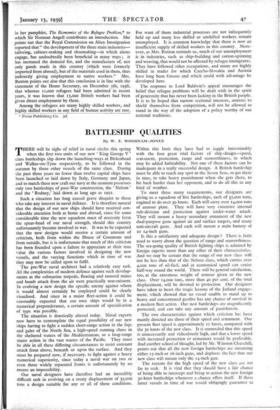REFUGEES : LIABILITY OR ASSET ?
By DR. G. F. McCLEARY
FOR anything comparable to the refugee problems that now confront the civilised world we must go back to the end of the seventeenth century, when " man's inhumanity to man " fell heavily upon the Huguenots. From 1680 onwards their emigration from France was on a very large scale. About 8o,000 landed in England, and though many left for Scotland, Ireland, or America the majority remained. They were welcomed with great generosity. Between 1681 and 1699 five public appeals were made for them, the second, made in 1686, bringing in from L4o,000 to Lso,000 and the last L25,000. These charitable contritutions were supple- mented by payments from the Privy Purse, and in 1696 Parliament voted an annual sum of £12,000 for the refugees besides £3,000 for their ministers. For those days, when the population of England and Wales was only about millions, these were enormous sums.
The refugees more than repaid what they received. They included large numbers of hard-working, highly skilled adepts in many trades that had not previously been practised with success in this country. Their coming brought about a much-needed expansion of British industry. They started many new skilled trades in London, developed the making of sailcloth in the Eastern counties, of calico printing in Richmond, and of linen in Scotland and Ireland. According to Cunningham, " It is hardly an exaggeration to say that almost every kind of industrial art was invigorated by the new standards of skill and of taste which these refugees brought with them." (Growth of English Industry and Commerce.) The homeless people who are now seeking a refuge also include large numbers of highly skilled workers. Many have won distinction in science, the arts, the professions, technology, or commerce. Some are of international reputa- tion. Such people would enrich any country in which they settled. To imagine that the refugees are carriers, so to speak, of germs of unemployment is to misconceive the position. Our ancestors fortunately held no such mistaken views about the Huguenots.
Australia has made a notable beginning. On December 1st the Minister of the Interior announced that Australia would in the next three years receive 15,000 refugees, and it is to be hoped that this example will be followed and developed by the other countries of the Commonwealth. The chief need of the Dominions at the present time is population. Since 1930 the ordinary flow of migration has been reversed ; in each of the seven years 1931-7 the net movement of migration was from the Dominions to the Mother Country. The Oversea Settlement Board, in their report issued May, 1938, point out that " migration-mindedness " has declined in this country ; and considering present population trends they find " little encouragement to the view that the United Kingdom will be in a position to supply settlers in sufficient numbers to provide the whole of those additions to their populations for which the circumstances of the Dominions call." They conclude that " the admission of a carefully regulated flow of foreign immigrants of assimilable types . . . has much to commend it," and they add that such settlers would " not only be a source of permanent enrichment to the life of the Dominions, but would at the same time increase their capacity for absorbing migrants from this country."
Attempts to receive immigrants on anything like an adequate scale, whether here or in the Dominions, will come up against the objection that their reception would increase unemploy- ment. No belief is more firmly implanted in the public mind than that unemployment shows that there are too many people in a country. Yet in the United States, which with its enormous area and resources could support a much greater population, unemployment is as prevalent as in this country, though immigration has since the War been severely restricted and the reproduction rate has sunk below replacement rate. Before the War, when the birth-rate in the United States was high and immigration unrestricted and copious, the population, i.e., the number of consumers, and therefore the demand for goods and services, increased rapidly and there was little talk of unemployment. Mr. Maynard Keynes and other distinguished economists have shown that the decrease in our population that now seems imminent, so far from reliev- ing unemployment, is likely to increase it. With a decreasing population demand tends to fall below expectations, over- supply is more likely to occur and to have more serious consequences. Unemployment due to a decrease of popula- tion will be specially dangerous, since it will be attributed by the public to any cause but the right one. There is hardly any subject on which public enlightenment is more needed than the economic consequences of a declining population.
We have now an opportunity for checking the threatened decline of the population of this country and at the same time relieving untold suffering. The objection that if we do what common humanity urges us to do we shall increase our burden of unemployment is dealt with by Mrs. Roden Buxton in her pamphlet, The Economics of the Refugee Problem,* to which Sir Norman Angell contributes an introduction. She points out that the Royal Commission on Alien Immigration reported that" the development of the three main industries— tailoring, cabinet-making and shoemaking—in which aliens engage, has undoubtedly been beneficial in many ways ; it has increased the demand for, and the manufacture of, not only goods made in this country (which were formerly imported from abroad), but of the materials used in them, thus indirectly giving employment to native workers." Mrs. Buxton points out also that this conclusion is in line with the statement of the Home Secretary, on December 5th, 1938, that whereas Ii,000 refugees had been admitted in recent years, it was known that 15,000 British workers had been given direct employment by them.
Among the refugees are many highly skilled workers, and highly skilled workers in any field of human activity are rare. * Focus Publishin3 Co. 3d. For want of them industrial processes are not infrequently held up and many less skilled or unskilled workers remain unemployed. It is. common knowledge that there is now an insufficient supply of skilled workers in this country. More- over, as Mrs. Buxton reminds us, much of our unemployment is in industries, such as ship-building and cotton-spinning and weaving, that would not be affected by refugee immigrants. They have followed other occupations, and many are highly skilled in trades for which Czecho-Slovakia and Austria have long been famous and which could with advantage be developed here.
The response to Lord Baldwin's appeal encourages the belief that refugee problems will be dealt with in the spirit of generosity that has never been lacking in the British people. It is to be hoped that narrow sectional interests, anxious to shield themselves from competition, will not be allowed to stand in the way of the adoption of a policy worthy of our national traditions.







































 Previous page
Previous page